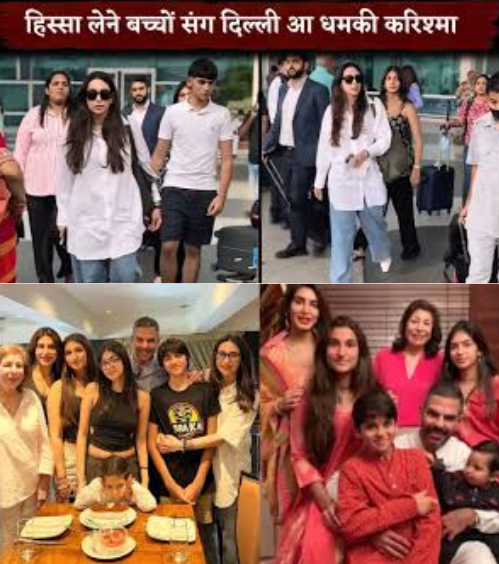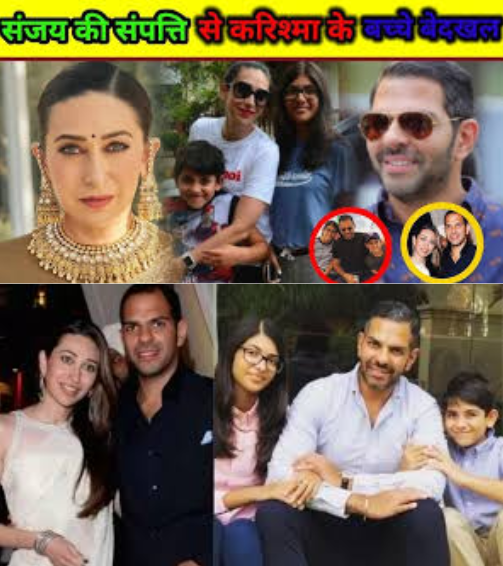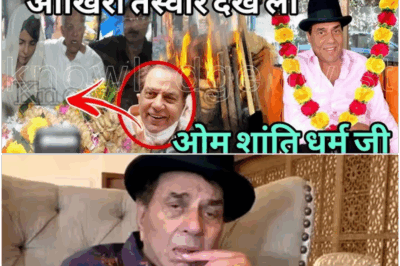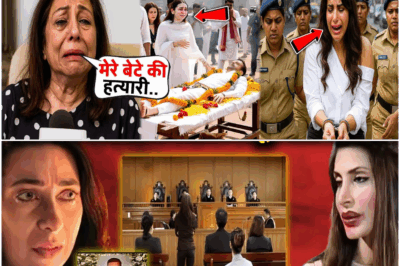Karisma Kapoor Reaches Delhi With Kids To Claim Share in Sanjay Kapoor’s 40,000 Crore Property
The sudden death of prominent Indian businessman Sunjay Kapur has sparked not just emotional turmoil for his family, but also a high-stakes legal drama over his estimated multi-thousand crore estate. Sunjay, the chairman of Sona Comstar, a major global automotive parts supplier, tragically passed away in June 2025 while playing polo in London. He reportedly suffered a heart attack following an allergic reaction to a bee sting. At the time of his death, Sunjay was 52 and had not publicly declared a will. His untimely demise has triggered a complex inheritance situation involving his current and former wives, along with their respective children.
In the days following his passing, media attention turned to Karisma Kapoor, Sunjay’s second wife and the mother of two of his children, Samaira and Kiaan. Despite being divorced since 2016, Karisma has now re-entered the spotlight after reportedly traveling to Delhi with her children to ensure their legal rights over their late father’s property are protected. While Karisma herself holds no claim on Sunjay’s estate due to their divorce nearly a decade ago, their two children are considered legitimate heirs. Karisma’s presence in Delhi, therefore, is seen not as a personal bid for property, but as a mother protecting her children’s rightful share in their father’s legacy.
Complicating the inheritance matter is Sunjay’s third wife, Priya Sachdev, a former model and businesswoman who married Sunjay in 2017. The couple had one son together. Following Sunjay’s death, Priya was swiftly appointed as a non-executive director on the board of Sona Comstar. Her sudden elevation raised eyebrows and fueled speculations about her role in managing Sunjay’s assets and influence over corporate affairs. In response to media scrutiny, she updated her social media profiles to reflect her new title, before making her account private.
Sunjay’s mother, Rani Kapur, added another layer of controversy to the situation by publicly expressing doubts about the circumstances surrounding her son’s death. She reportedly claimed that she was coerced into signing papers regarding his assets shortly after his death, during a time when she was in deep grief. Her statement hinted at internal family discord and appeared to question Priya Sachdev’s intentions, suggesting that the third wife may be attempting to consolidate power and take control of Sunjay’s considerable fortune, reportedly worth upwards of ₹30,000 crore.

With no will presented to date, Indian inheritance law stipulates that Sunjay’s estate would be equally divided among his legal heirs—his surviving children and spouse. This implies that Samaira and Kiaan, Karisma’s children, along with Priya and her son, would all have legal rights to the property. However, without formal directives, the division is open to dispute, and tensions appear to be rising between the different branches of the Kapur family.
From a legal perspective, Karisma Kapoor is not directly entitled to any share of the estate. However, as the mother and legal guardian of Sunjay’s two children, she is expected to represent their interests in potential legal proceedings. Sources close to the family suggest that Sunjay had made some provisions for his children prior to his death. These include property and bonds held in trust, particularly for Kiaan, who is still a minor. These arrangements may ensure financial security, but they do not resolve the broader dispute over the massive family fortune, especially if Priya seeks full control over Sona Comstar or related businesses.
The dynamics of the dispute are further complicated by Sunjay’s marital history. His first marriage to fashion designer Nandita Mahtani ended in divorce after just a few years. His second marriage to Karisma Kapoor in 2003 was highly publicized and marked by a turbulent divorce in 2016, with public allegations and a long custody battle over their two children. Karisma reportedly accused Sunjay of domestic abuse and infidelity, while Sunjay counterclaimed that the marriage failed due to irreconcilable differences and interference from Karisma’s family. Their separation was bitter and heavily covered by Indian media at the time.
Despite this acrimonious past, Sunjay and Karisma appeared to have maintained a cordial relationship in later years for the sake of their children. Following Sunjay’s death, Karisma and the children reportedly participated in signing the funeral documents, a symbolic gesture that reaffirms their role in the family, even though they have long lived apart. Now, with legal inheritance matters coming to the fore, Karisma’s renewed presence in Delhi suggests that she is determined to secure her children’s financial legacy, especially in the face of growing speculation about Priya Sachdev’s intentions and the absence of a will.

As this dispute unfolds, the public and media remain transfixed not only due to the size of the fortune involved but also because of the celebrity connection. Karisma Kapoor, once a reigning Bollywood actress of the 1990s and early 2000s, has mostly stayed out of the limelight in recent years. Her re-entry into public discourse through this emotionally charged family matter has drawn sympathy and support from fans, many of whom remember her difficult marriage and applaud her apparent resolve to protect her children’s inheritance.
Meanwhile, Sona Comstar—the automotive giant Sunjay chaired—continues to operate, but under increased scrutiny. Industry analysts are watching closely to see how the board reshuffles following his death and whether there are any changes in the company’s direction under Priya’s new role. Shareholders and business partners may grow concerned about potential internal family conflict spilling into corporate governance, especially as the company has global operations and is publicly listed.
The legal process is expected to be protracted. If Karisma Kapoor or her legal representatives formally challenge any decisions or claims made by Priya Sachdev regarding the estate, it could result in a long-drawn civil case under Indian inheritance and family law. Given the value of the assets at stake—ranging from luxury properties in India and abroad, equity in listed firms, luxury cars, art, and cash reserves—any division of wealth will require court oversight and possibly mediation. Rani Kapur, as Sunjay’s surviving parent, may also choose to file legal action or join proceedings if she believes the estate is being unfairly handled.

What makes the situation even more sensitive is the emotional undercurrent of grief that overlays the property dispute. The family is grappling with the loss of a son, husband, and father, even as legal teams prepare to argue over financial claims. While Priya Sachdev is reportedly attempting to shield her son from media attention, she is also perceived by some family members as moving too quickly to assert authority. On the other hand, Karisma’s recent visibility is seen as both a personal gesture of remembrance and a legal move to prevent her children from being marginalized.
In conclusion, the unfolding inheritance conflict following Sunjay Kapur’s death illustrates the complexity of modern family structures in India, especially in cases involving multiple marriages, high net-worth individuals, and minor children. While the law may eventually resolve the distribution of assets, the emotional and relational wounds left by such disputes can take years, if not decades, to heal. As Karisma Kapoor steps once again into the public eye, not as a film star but as a mother and protector of her children’s rights, the nation watches to see how this high-profile family saga will resolve—and whether justice, both legal and personal, will prevail.
Play video :
News
Salman Khan’s Bodygaurd Shera First Ever Advertiement With Instamart | Shera Ad
Salman Khan’s Bodygaurd Shera First Ever Advertiement With Instamart | Shera Ad In the heart of Mumbai’s bustling Andheri, a…
🔴Fans and stars arrived to see Dharmendra for the last time? Did Dharmendra really die? Dharmendra health
🔴Fans and stars arrived to see Dharmendra for the last time? Did Dharmendra really die? Dharmendra health . . ….
Wife Priya Sachdev killed Sanjay Kapoor for money! Mother-in-law Rani Kapoor makes a big revelation on property dispute
Wife Priya Sachdev killed Sanjay Kapoor for money! Mother-in-law Rani Kapoor makes a big revelation on property dispute. . ….
Priya Sachdev’s conspiracy was foiled by her mother Rani Kapoor, shocking truth came out. Karishma Kapoor
Priya Sachdev’s conspiracy was foiled by her mother Rani Kapoor, shocking truth came out. Karishma Kapoor. . . . Rani…
Sad News About Mithun Chakraborty | Mithun Chakraborty Health Scare | Mithun Chakraborty Movies Full
Sad News About Mithun Chakraborty | Mithun Chakraborty Health Scare | Mithun Chakraborty Movies Full . . . Sad News…
Seema Sajdeh Accept Dating Ex-Fiancee Vikram Ahuja | Sohail khan’s Ex Wife
Seema Sajdeh Accept Dating Ex-Fiancee Vikram Ahuja | Sohail khan’s Ex Wife Thirty years after her whirlwind romance with Sohail…
End of content
No more pages to load












